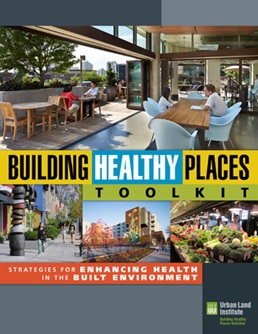Building Healthy Places Toolkit

Strategies for Enhancing Health in the Built Environment
The Building Healthy Places Toolkit outlines evidence-supported opportunities to enhance health through changes in approaches to buildings and projects. Developers, owners, property managers, designers, investors, and others involved in real estate decision making can use the strategies described in this report to create places that contribute to healthier people and communities, and enhance and preserve value by meeting the growing desire for health-promoting places.
Author: Urban Land Institute
Book Summary: The Building Healthy Places Toolkit outlines evidence-supported opportunities to enhance health through changes in approaches to buildings and projects. Developers, owners, property managers, designers, investors, and others involved in real estate decision making can use the strategies described in this report to create places that contribute to healthier people and communities, and enhance and preserve value by meeting the growing desire for health-promoting places.
Author: Urban Land Institute


